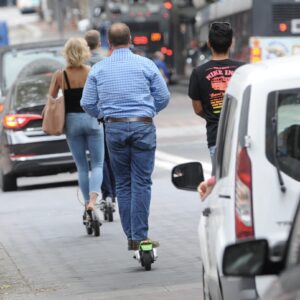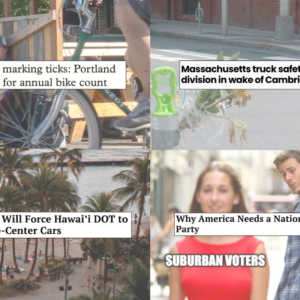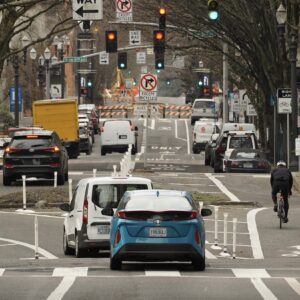
On Friday afternoon, I was only a few minutes into my interview with Ride Report Founder and former CEO William Henderson when I threw my notes aside and realized they’d be useless.
BikePortland has covered nearly every twist-and-turn of Henderson’s journey in the transportation data industry since our profile of him in 2015. So I prepped notes with a timeline of the past eight years that included: how he turned a passion for bike advocacy into a piece of hardware that counted bike trips (a gadget we proclaimed would “change bike planning forever”) and earned the interest (and investment) of the Portland Bureau of Transportation, to a successful app that set him on a different course; how he became a “smart city” darling and raised $13 million from venture capital firms; and how his company launched data dashboards to track bike share and e-scooter fleets for Portland and dozens of cities worldwide.
So imagine my surprise when Henderson said at the beginning of our chat that, “Bike counts are not the most important conversation,” and that, “we need to challenge that idea that quantification is the place to start,” when it comes to bike advocacy and pushing for systemic transportation reform.
Henderson’s self-reflective skepticism made more sense after I learned he majored in math and philosophy at Reed College, only got into tech (he worked at Apple and Square before creating the Ride Report app) to pay back student loans, described himself as a reluctant capitalist, and once dabbled in monasticism.
With flowing hair looking like it wanted to break free from his headphones during our online conversation, Henderson opined, “You can’t unbuild the house with the master’s tools.” An urbanist and bike advocate at heart, the “house” in this metaphor is America’s car-centric transportation system. “What I’ve come to understand is that bike counts are ultimately vehicle thinking translated into, ‘Okay, now let’s apply that to bike planning.'”
Henderson thinks the zeal advocates show for boosting bike counts is the same dead-end, “volume thinking” that has led to massive freeways and bloated transit projects.
Instead of being focused on a higher mode split percentage and a turnaround of our cycling decline, Henderson thinks the entire premise and practice of “bike advocacy” needs to be re-assessed in light of the new, post-pandemic reality where neighborhood proximity has replaced the old, hub-and-spoke model where downtown was the center of our planning maps.
Henderson still believes accurate and robust bike counts are essential tools for planners, but it’s clear he has moved to a different place, philosophically:
“We’re still thinking about the bike as, ‘Can it compete with the car as a way to bring people downtown and back home on their commute?’ I don’t think people actually believe that’s the best way to measure bikes, or that it’s the most impactful thing that bikes can do for our community. But that’s actually how the system works, because we just took car culture, car thinking and engineering, and translated it over to bikes.
We need to really step back and say, ‘What are we really trying to do here?’ We’re not trying to compete with the car on its own merits, because that doesn’t work.”
Hear my full interview with Henderson in the player above or wherever you get your podcasts. Visit the BikePortland Podcast page to browse more episodes.







Thanks for reading.
BikePortland has served this community with independent community journalism since 2005. We rely on subscriptions from readers like you to survive. Your financial support is vital in keeping this valuable resource alive and well.
Please subscribe today to strengthen and expand our work.
I really enjoyed this episode, it was nice to hear an interview with “a person in tech” that’s not a self aggrandizing sack of poo.
In a more rational world where resources are not so constrained counts would not be necessary because we’d just look at where people live and jobs exist and connect them with lots of travel options including low stress bicycle infrastructure. But infrastructure grants and tools like AASHTO’s safety performance functions require bike counts as does system operation and high level performance monitoring. Used properly and in sufficient quantity you can tell amazing stories with these data and make the job of building more bike infrastructure easier, like our Portland’s neighbors to the south have apparently done (https://www.oregon.gov/ODOT/Programs/ResearchDocuments/Bicycle%20Count%20Data%20What%20is%20it%20Good%20For%20-%20Research%20Note.pdf)
Ideally too counts data can help document benefits of use which other cities (other than the one collecting counts) can benefit and then stand on the shoulders of giants and do some building of their own.
In tuff financial times it’s hard to appreciate data so it’s usually the first thing to get cut so this story may be more fodder to down size the data collection that does happen which would be mistake I think.
I finally got a chance to listen to this episode and it was great! I really enjoyed the whole discussion, especially the higher level discussion on what we are ultimately trying to achieve with bike advocacy.